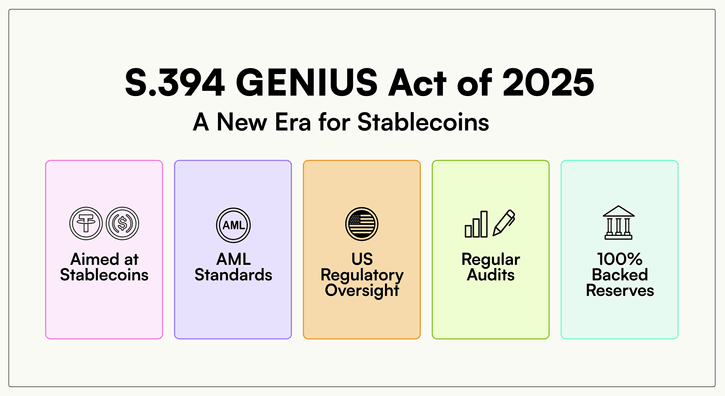In July 2025, the United States enacted the GENIUS Act (Guaranteed Electronic Notes and Institutional Utility for Stablecoins). This is the first comprehensive federal framework for stablecoins, a market valued at more than 160 billion dollars.
For years, stablecoins were critical to digital asset markets but operated in a regulatory grey zone. Their role in payments, settlement, and DeFi grew rapidly, yet they lacked clear legal treatment. The GENIUS Act closes that gap, giving investors, issuers, and institutions a framework that delivers both certainty and opportunity.
As Circle CFO Jeremy Fox-Geen observed, “Regulatory clarity invites participation from mainstream institutions.”
Learn about the opportunities offered by the Rootstock Ecosystem Partners for institutions.
Stablecoins Enter a New Regulatory Era
The Act defines a “payment stablecoin” and sets enforceable standards. These provisions move stablecoins from loosely regulated innovation to recognized cash-like instruments:
- Backing requirements: One-to-one reserves held in U.S. dollars, Treasury bills, or high-quality cash equivalents
- Legal classification: Explicitly not securities or commodities, removing SEC and CFTC jurisdiction
- Reserve protections: Ringfenced assets with top priority for holders in bankruptcy
- Issuer restrictions: Prohibition on offering interest or yield directly to holders
With these new standards, investors can now treat stablecoins as regulated, cash-like assets for settlement, treasury management, and yield strategies.
Who Benefits in the Post GENIUS Landscape
The framework creates clear beneficiaries:
- Compliant issuers such as Circle and federally chartered fintechs
- Corporate giants including Amazon and Walmart, which may pursue branded stablecoins
- DeFi protocols that integrate regulated stablecoins, offering institutions compliant access to liquidity and yield strategies
- U.S. Treasuries, where demand for short-term government debt could increase by more than 1 trillion dollars over the next three years
As MIT’s Christian Catalini summarized, “The Genius bill will ensure stablecoin reserves will be safe and boring.”
What It Means for Institutional Investors
For institutions, the Act establishes stablecoins as a new class of regulated instruments. The benefits are clear:
- On-chain cash management: A compliant way to hold and move dollar value without banking friction
- Yield strategies: While issuers cannot pay interest, stablecoins can serve as collateral in DeFi to generate compliant yield
- Treasury surrogates: Programmable alternatives to cash management tools, enabling faster settlement cycles
- Risk reduction: Segregated reserves and expedited bankruptcy protections lower counterparty risks
- Cross-chain opportunities: Bitcoin-native assets like rBTC can be paired with regulated stablecoins, combining security, liquidity, and compliance
Permitted Transactions Without Authorization
Under the GENIUS Act, certain categories of transactions can still be conducted in the United States without prior authorization:
- P2P transactions: Direct transfers between two individuals acting on their own behalf without an intermediary (for example, Binance P2P)
- Own-account transfers: Transactions between accounts owned by the same individual in the U.S. and abroad when offered under the same parent company (for example, Coinbase US to Coinbase EU)
- Non-custodial wallets: Transfers conducted directly between non-custodial wallets, where users retain full control of their assets
These carveouts ensure that individuals can still transact freely under limited circumstances, while centralized and institutional activities face stricter oversight.
Legal Takeaways from the GENIUS Act
The GENIUS Act creates a structured compliance framework that finally defines how stablecoins fit into U.S. financial law. Payment stablecoins issued by approved entities are not treated as securities or commodities, which removes them from the oversight of both the SEC and the CFTC.
Issuers are bound by strict obligations to protect users and ensure stablecoins are used as settlement tools rather than investment products. Key rules include:
- Reserves must be fully backed, segregated, and never rehypothecated
- Redemption must always occur at par value
- No yield or interest can be offered to holders
- Issuers must comply with Bank Secrecy Act obligations
- Marketing must frame stablecoins as settlement assets, not investments
To safeguard investors, the Act guarantees that in the event of insolvency, stablecoin holders are given top priority, with courts required to expedite review and distribution of reserves.
The legislation also clarifies which entities qualify as Digital Asset Service Providers (DASPs). Exchanges, custodians, transfer agents, and issuance-related service providers fall under this definition. By contrast, protocols, self-custodial software, validators, immutable code, and participants in peer-to-peer pools are excluded from regulatory scope.
In addition, the Act defines a “digital asset” broadly as any representation of value recorded on a cryptographically secured distributed ledger. Looking ahead, a prohibition takes effect in July 2028: DASPs will not be permitted to sell or offer payment stablecoins in the U.S. unless those coins are issued by approved issuers.
The Road Ahead: Institutional-Grade DeFi, Powered by Bitcoin
The GENIUS Act rolls out in stages, with core provisions active in January 2027 and full compliance required by mid-2028. This gives institutions a clear runway to build stablecoin strategies into their operations with confidence. At the same time, it opens the door for Bitcoin-secured DeFi. Rootstock provides the infrastructure for compliant stablecoin use anchored to Bitcoin’s settlement security. With rBTC as the bridge, institutions can combine regulated reserves, programmable smart contracts, and trust-minimized settlement.
Stablecoins are no longer experimental. They are becoming regulated instruments ready to power institutional-grade DeFi, and Rootstock is positioned to deliver the foundation where safety, yield, and compliance converge.
